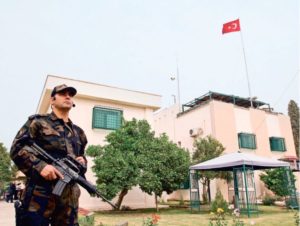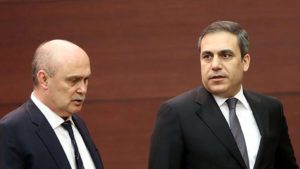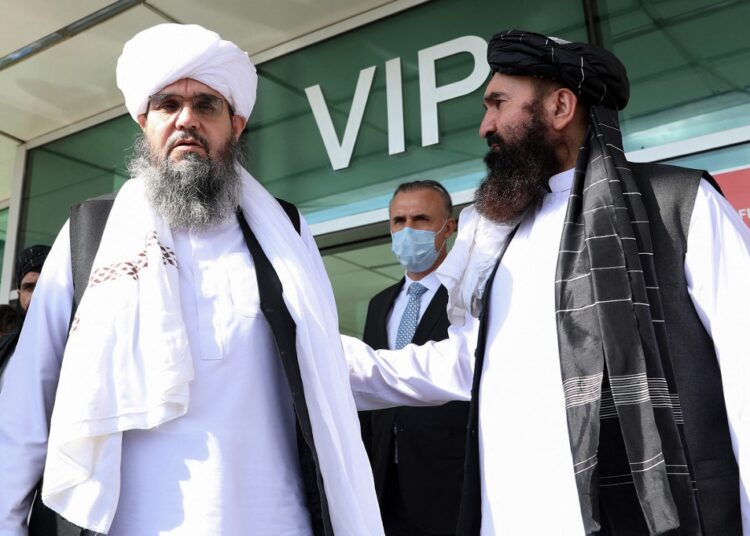Abdullah Bozkurt/Stockholm
A confidant of the Turkish president who was involved in secret talks with the Islamic State in Iraq and Syria (ISIS) has been appointed by the UN secretary-general as special coordinator for Afghanistan.
Feridun Sinirlioğlu, a former diplomat who for years had carried out the dirty dealings of President Recep Tayyip Erdogan, was named by UN chief Antonio Guterres as special coordinator for the independent assessment of Afghanistan on April 23.
Sinirlioğlu played a critical role in a plot that envisaged the deliberate surrender of the Turkish consulate general in Mosul to advancing ISIS fighters in order to make room for negotiations with the terrorist group, release ISIS detainees from Turkish prisons and tap into smuggled oil. Nordic Monitor previously published a detailed investigative piece on the entire hostage crisis in December 2022.
Öztürk Yılmaz, Turkey’s then-consul general in Mosul and one of the hostages captured by ISIS, said on November 13, 2022 he believes some people in the government sold him and the other hostages out in order to benefit financially from ISIS oil in Syria.
“I had resisted [as a hostage] for 101 days. … But the low lifes here, the dishonest people [government leaders], threw us under the bus. They cooperated with ISIS to get money and oil in Syria. They sold us out,” he told fellow party members at a political convention.
As a man who knew all the secrets of the hostage saga, he decided to spill the beans, publicly accusing Erdogan and his associates of cooperating with ISIS in a clandestine deal.
He said he had sent cables and made hundreds of phone calls as ISIS approached the consulate, providing coordinates for ISIS fighter units but couldn’t get Turkish authorities to launch airstrikes on the advancing ISIS troops. He also revealed that Turkey had secretly pulled out all intelligence officers from the area before the seizure, another smoking gun that confirmed the secret cooperation with ISIS.

The emergency cables and reports he sent to the foreign ministry in Ankara disappeared, and for that he accused then-foreign affairs undersecretary Sinirlioğlu, the number two at the ministry at the time, of playing a key role in the plot. His calls to Sinirlioğlu during those 101 days of captivity with a phone he kept hidden from his ISIS captors remained mainly unreturned.
In an interview he gave on November 28, 2022, the former diplomat provided further details on how the consulate fell to the advancing ISIS troops, saying some members of the security detail recently deployed to protect the consulate cooperated with ISIS. It appears Erdogan did not want to leave anything to chance and sent a select team of guards to the consulate for a smooth carrying out of the plot.
Talking about a special operations police officer (Özel Harekat Polisi) identified only by the initials A.Y., Yılmaz said: “The man is an ISIS member. … He was deployed and arrived a few days before the [ISIS] raid. He had signed up for watch duty at the gate. It turned out that he also spoke Arabic. This opened the door to the ISIS militants and forced the consulate personnel to surrender to ISIS. He had all the guns collected. This is the person who was opposed when I ordered the guards to open fire and shoot at ISIS.”
During the days in captivity, Yılmaz managed to make phone calls to Sinirlioğlu on the mobile phone he had kept hidden from ISIS. That communication was something Sinirlioğlu and other Turkish officials including Hakan Fidan, the head of intelligence agency MIT, did not factor into their original plan. They had to make sure the calls were not registered or leaked.
According to Yılmaz, Turkish officials leaked information about the stashed phone to ISIS.

“I had two phones. When ISIS started collecting phones, I handed over one of the phones and didn’t give them the other. I dismantled the phone and hid it since I had to communicate with the government. I spoke in secrecy. I provided details [to Sinirlioğlu on the phone while I was] in the bathroom. The battery was dying, and I couldn’t trust anyone. I had to keep it all secret. After I made the calls, ISIS started to conduct searches. How did they know I was making phone calls? It turns out they were getting the information from Ankara. They [officials in Ankara] wanted to have my phone seized. After each call, ISIS carried out a search,” Yılmaz said.
Sinirlioğlu urged Yılmaz not to call anybody except him and to never tell anybody about what was going on at the consulate. The emergency call center, set up by the foreign ministry for family members concerned about the hostages, were not provided any details by Sinirlioğlu or any other senior staff at the ministry.
Sinirlioğlu, who served an unusually long time as undersecretary at the foreign ministry, has been a loyal confidant of Erdogan, with whom he plotted dozens of clandestine operations, many illegal, including staging a false flag military intervention in Syria. He was one of the ardent supporters of armed conflict in a leaked recording in March 2014 in which he, Turkish intelligence chief Fidan and others were heard discussing the possibility of an intervention in Syria in a false flag operation conducted by MİT.
Interestingly, Sinirlioğlu was hawkish at the meeting and insisted on a military invasion of Syria, while Fidan was proposing ideas on how to create a pretext, saying: “If needed, I would dispatch four men to Syria. [Then] I would have them fire eight mortar shells at the Turkish side and create an excuse for war.” However, the military resisted the idea until 2016, when the Erdogan government managed to purge nearly all NATO-affiliated officers who opposed war in Syria after a false flag coup attempt.

The Turkish government was happy with the Taliban’s comeback in Afghanistan after the US and allies’ withdrawal, with President Erdogan saying on July 20, 2021 that his government shared the Taliban’s ideology. He said his government would negotiate with the Taliban, who he said should feel comfortable talking with Turkey as opposed to the Americans. He justified his reasoning by underlining that “Turkey has nothing against the Taliban’s ideology, and since we aren’t in conflict with the Taliban’s beliefs, I believe we can better discuss and agree with them on issues.”
The Taliban responded by saying it would view Turkey as an ally rather than an enemy after taking over Kabul and cementing control of the entire country. It appears the Taliban heard loud and clear the message of President Erdogan, who said he shares the Taliban’s ideology.
During the Syrian conflict, the Erdogan government tapped Turkish jihadists who were trained and fought in Afghanistan and enlisted them in new jihadist ventures in foreign countries in cooperation with Turkish intelligence agency MIT. Many veteran Turkish jihadists who were in prison were released by the government over the years.
Right after the US left Afghanistan, Erdogan sent top officials to the Taliban in a bid to strike an agreement and later hosted senior Taliban figures, some of whom were still under UN sanctions, in Ankara.
Turkish private military contractor SADAT, a paramilitary unit loyal to the Islamist president of Turkey, had advocated the idea of Turkey supporting and helping the Taliban, a group it has called a resistance movement, establish a Sharia (the religious law of Islam) state in Afghanistan.

A research piece published on September 13, 2021 by Ali Coşar, a retired colonel and board member of SADAT, advocated that Turkey help the new Afghanistan run by the Taliban in cooperation with Pakistan, Qatar and Malaysia.
Nureddin Yıldız, a radical cleric close to President Erdogan who openly advocates armed jihad, posted a video on his Facebook page, which has close to 700,000 followers, on the day the Taliban took over Afghanistan, praising Sharia and explaining that the duty of all Muslims was to implement Sharia law.
Faruk Beşer, a theologian and columnist for the Yeni Şafak daily, which is published by the pro-Erdogan Albayrak Group, wrote on Twitter that “we follow the Taliban with attention and excitement. We rejoice in their victory.”
At times, Turkey was seen as realigning its policies with the Taliban in international forums. For example the Turkish government opposed a Parliamentary Assembly of the Council of Europe (PACE) resolution that sought the engagement of member states in Afghanistan conditional on the Taliban’s respect for the human rights of minorities, women and LGBTI people.
Erdogan’s remarks on the Taliban:
On September 30, 2021 PACE discussed the situation in Afghanistan and adopted a resolution that called on member states including Turkey to comply with recommendations on how to handle the Taliban and Afghan refugees who have fled the country.
The resolution was amended to include a provision on vulnerable groups such as minorities, women and LGBTI people and asked members “make any upgrading of their operational engagement with the Taliban conditional upon the respect of human rights, in particular those of vulnerable groups such as minorities, women and LGBTI people, and humanitarian law.”
Under instructions from his government, Ahmet Yıldız, head of the Turkish delegation to PACE and a member of Turkey’s ruling Justice and Development Party (AKP), which is led by Erdogan, announced his opposition to the PACE amendment.












